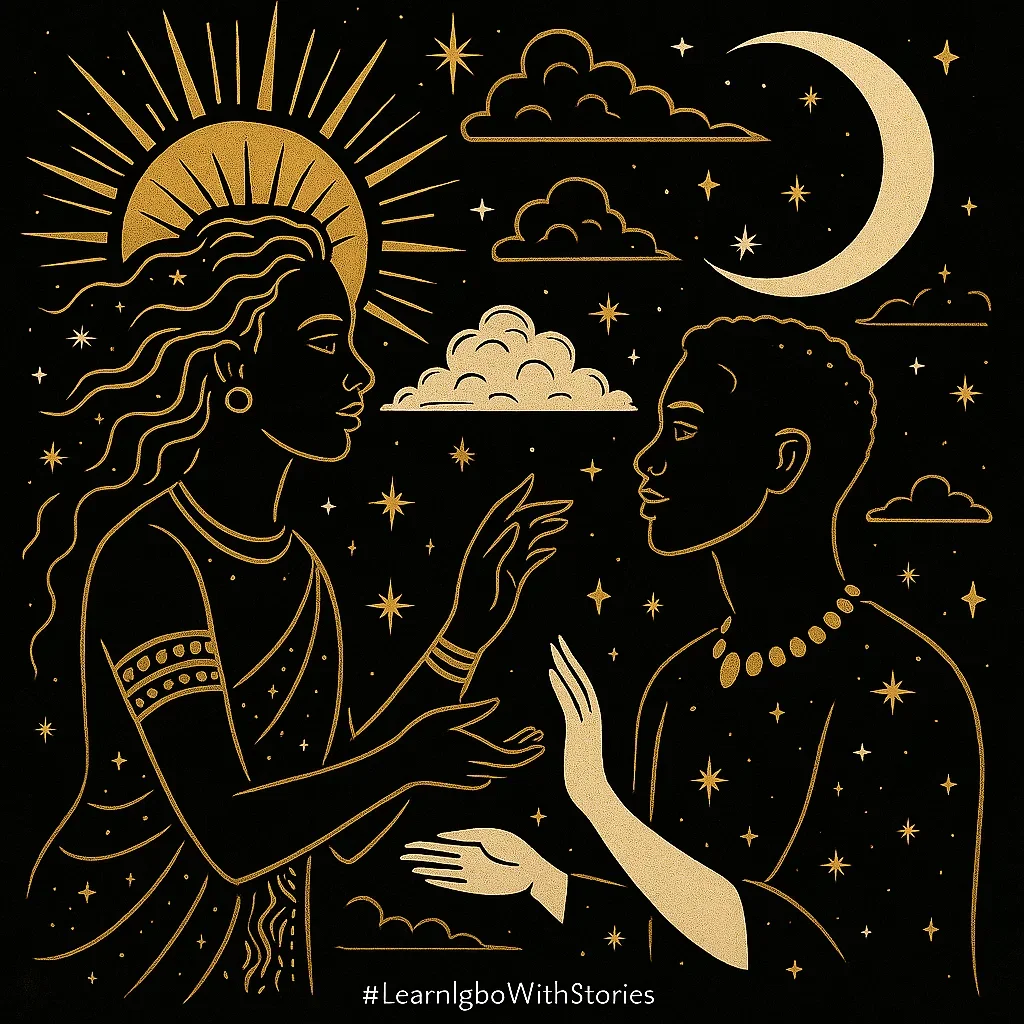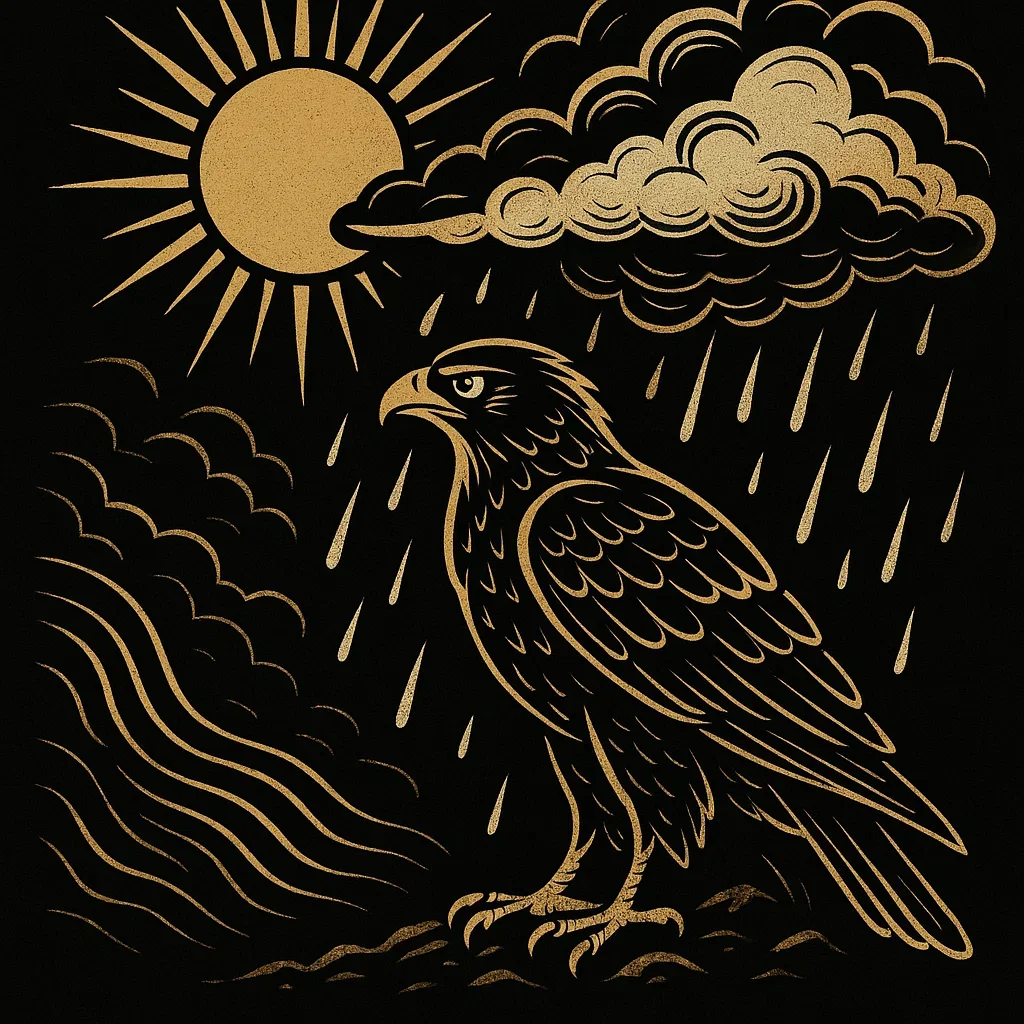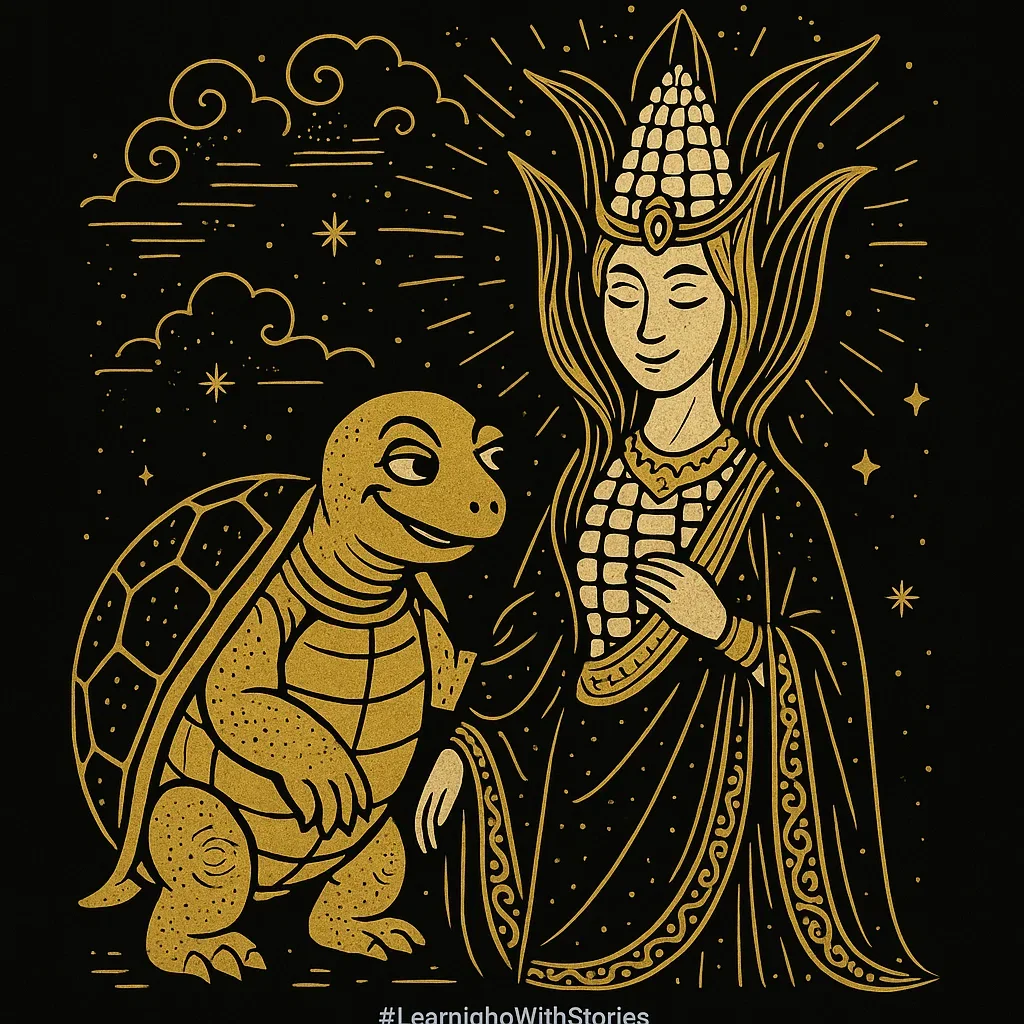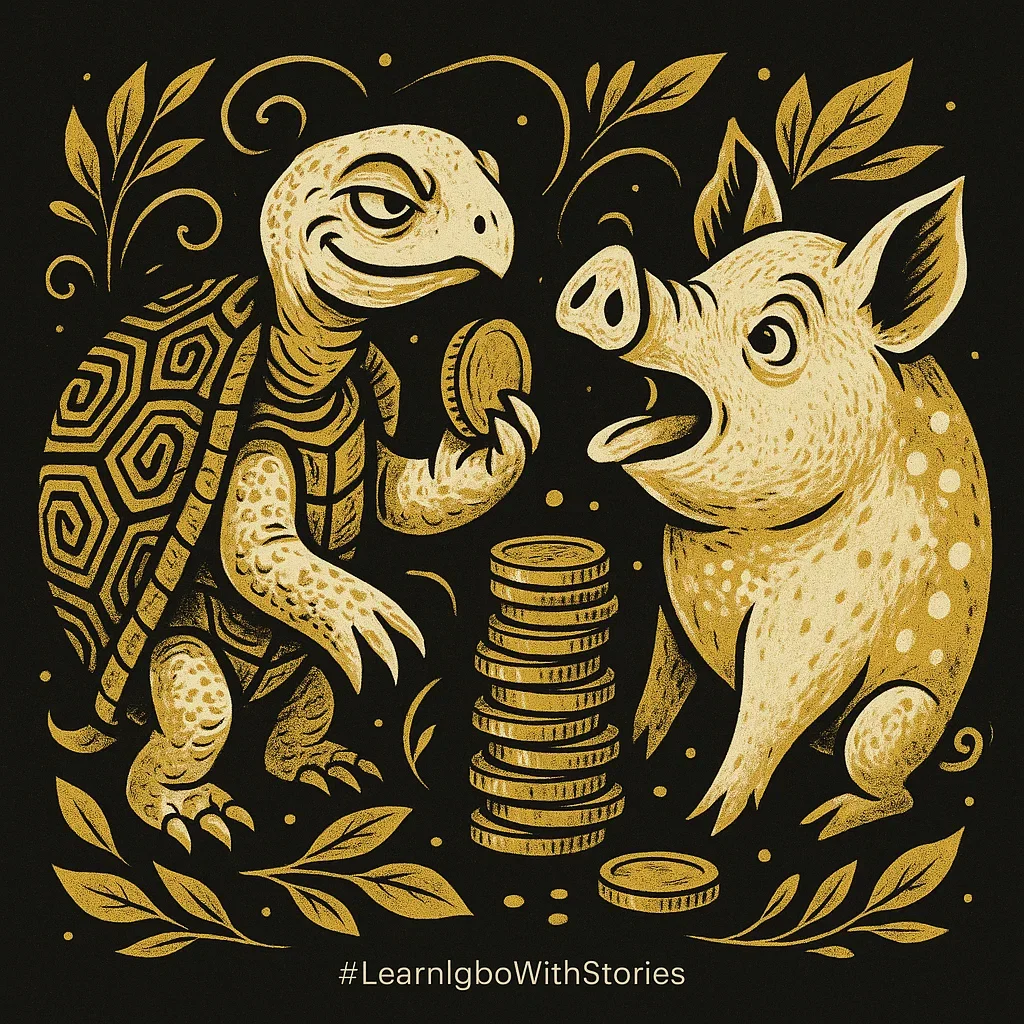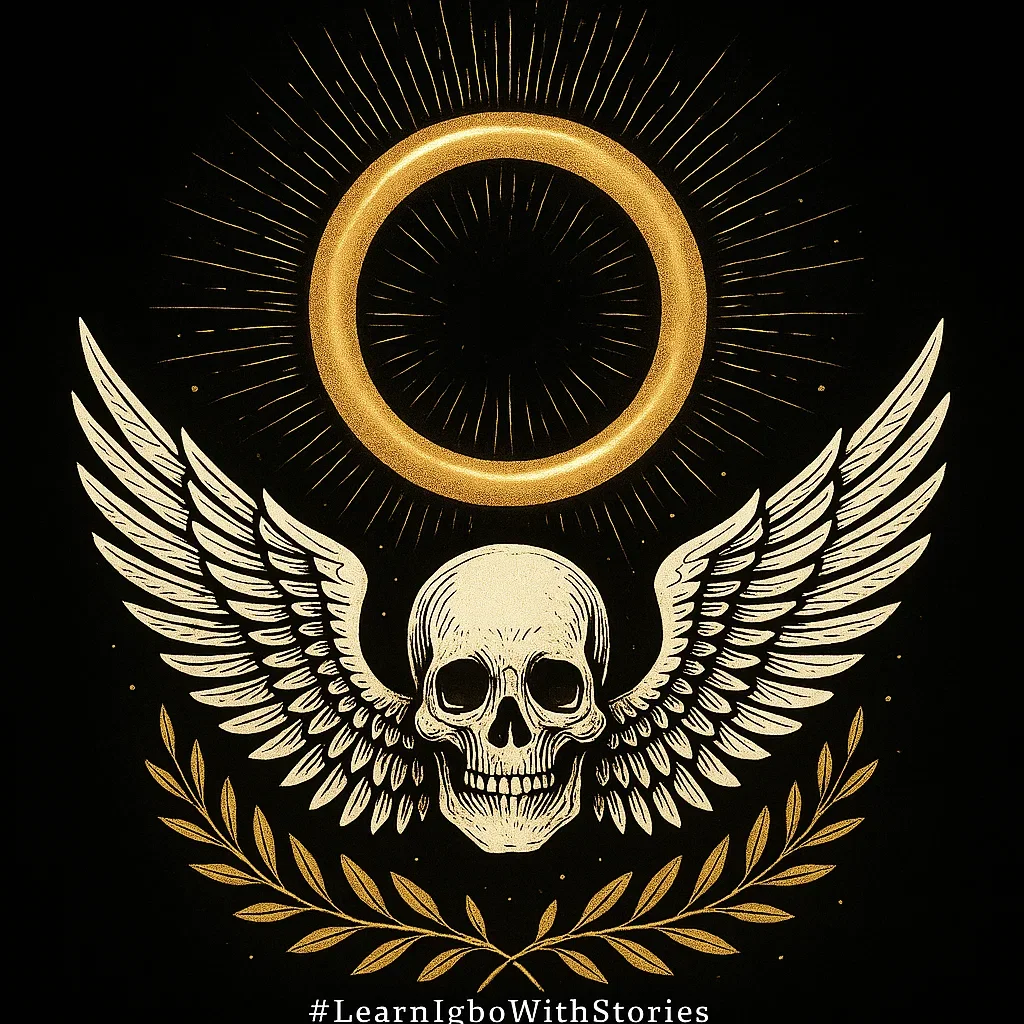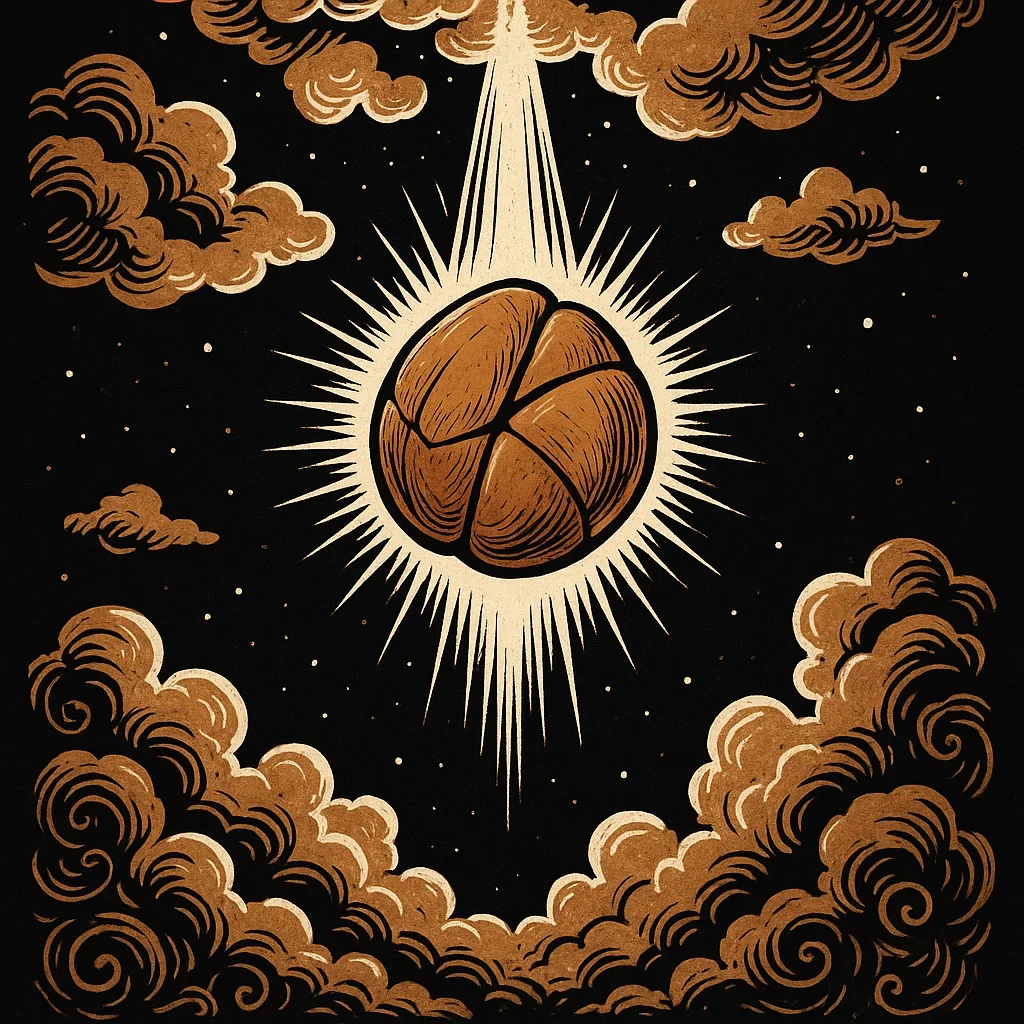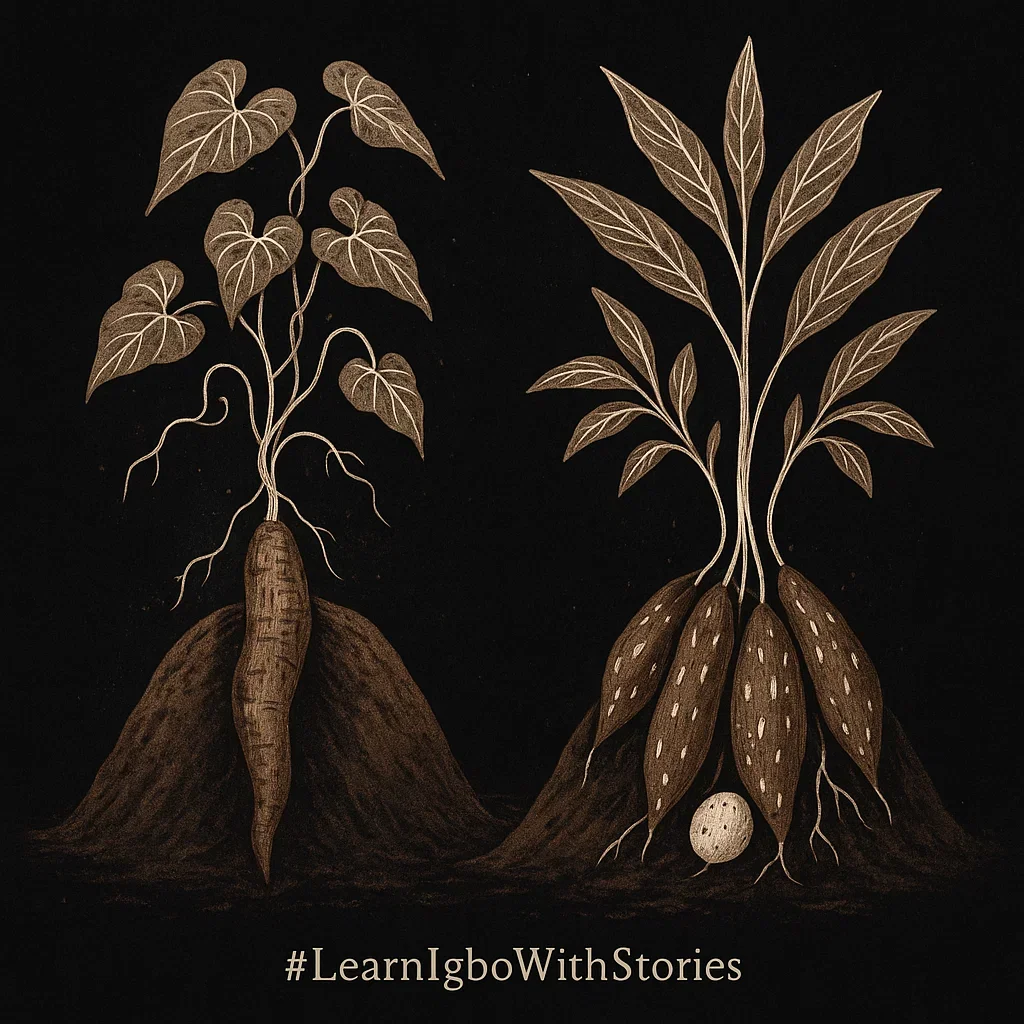Learn Igbo With The Story of Eri and How Yam Came to Be (Listening Exercise)
This post is set to “Public View,” so anyone with a link can view it. Feel free to share with others.
Lesson Notes
Listen carefully to this story in Igbo and use it as a listening exercise. Don’t worry about how much you understand at first. We recommend engaging with it in different ways:
Listen freely, just to get the auditory feel.
Listen again while following the translations or written text below.
Listen once more while noting the keywords that stand out to you.
Feel free to get creative in how you use this story for practice. The ultimate goal is to strengthen your listening skills while learning Igbo. With time, you’ll notice your understanding improving naturally.
Keywords (Okwú ìbù n’ òbì): Ancient (Ògé gboo), Blacksmith (Ọ́kpụ ụ̀zụ̀), Grave (Ìlì), War (Ághà), Earth (Élú Ụ̀wà), World (Ụ̀wà), Anthill (Mkpù), Wind (Ífùfé), Bloodline (Àgbụrụ), First son (Ọ́kpárá), First daughter (Àdá), Faithful (Ntụ̀kwàsị́ òbí).
Listen to the Story
Story Title & Credits
The Story of Eri and How Yam Came to Be in Igbo Land
Àkụ́kọ̀ gbasara Èrì na Òtù Jí sí bị̀a n’Àlà Ìgbò
Igbo Mythology & Folklore
Àkụ́kọ̀ na Ìfò ndị Ìgbò
Written by Oma, Translated by Uzoma.
Ọ́má dère ya, Ụzọma tụgharịrị ya.
Listen again, let’s get a bit more practice in!
Use the highlighted text segments below to practice your Igbo vocabulary.
Long ago, before the rise of kingdoms and the planting of crops, before men knew sleep or the taste of yam, the world was wild and unsettled. In those ancient times, the Almighty Chukwu Okike looked upon the Earth and saw its emptiness. The world was marshy and soft, soaked in waters that had no shape. There were no people, no farms, and no stories to be told.
Na óge gàrà àgà, túpù e guzòbé ọchị́chì na ịkọ̀ ùbì, túpù ụ́mụ̀ mmádụ àmụ́tà ìhì ụ́rà mà ọ bụ̀ ụ́tọ̀ jí, Ụ́wà gbasàrà ma tọ̀gbọrọ cháko. N’óge gboò à, Chúkwú Òkìkè, Onyé Pụrụ Ímé Ìhè niílé, lèrè Ụ́wà ànyà, wè hụ òhèrè dị na ya. Ụ́wà àhụ̀ jùpùtàrà na mmírí, dị nrò, ká àlà na enwéghí àkpụ́kpọ̀. Ènwéghí mmádụ, ènwéghí ùgbò, ọ dị́ghịkwa àkụ́kọ̀ dị a gà-àkọ̀.
From the heavens, Chukwu sent down a man named Eri. Eri descended from the sky and landed gently upon the Earth. Where he touched down was the center of the land now known as Nri, one of the oldest kingdoms in Igbo land. But the Earth was not firm, it was swampy and unstable. Eri, seeing the soft watery ground, sat upon an ant-hill, the only dry place he could find, and lifted his voice in complaint to Chukwu.
Site n’èlú-ìgwè, Chúkwú zìtere otu nwókè àhà ya bụ̀ Èrì. Èrì gbàdatàrà si na mbàrá ígwè mà daa nwayọ̀ n’Ụ́wà. Ébé ọ tụ̀rụ̀ ụ́kwụ̀ ghọ́rọ̀ etíti àlà a na-akpọ̀ Ǹrì ùgbú à, otu n’ ìmé àlà ọchịchị̀ kàchá òchíè n’Àlà Ìgbò. Màna àlà esìghí íké, ọ bụ̀ ọdòmmírí mà ọ kwụsíghí íké. Èrì, na íhụ́ na àlà ahụ̀ dì nrò mà jùpùtà na mmírí, nọ̀dìrị̀ ọdụ̀ n’élú ḿkpú, bụ̀ nanị́ ébé kpọ̀rọ̀ nkụ́ ọ chọ́tàrà, wé wèlíé òlù ya na mkpèsà nyè Chúkwú.
Chukwu, hearing his faithful servant, sent help: a master blacksmith from Awka, a man of fire and skill, bearing a fiery bellow, charcoal, and tools forged in the heavens. The blacksmith struck the earth with fire and wind. He dried the land, hardened the soil, and gave Eri a place to build and to live. For this sacred service, Chukwu gave the blacksmith the Ofo for this craft, a holy staff of authority, marking him and his descendants as the keepers of fire and forge in Igbo land.
Chúkwú, na ịnụ́ òlù onye ozi ya kwesìrì ntụ̀kwàsị́ òbí, zìtere enyémáka: díbịa ụ̀zụ̀ nke si Ọ̀kà, nwóké nke ọ́kụ́ na nkà, bụ́ onye bú údù́ ọ́kụ́, unyiọ́kụ́, na ngwá òrụ́ akpụrụ̀ n’èlú-ígwè. ọ́kpụ ụ̀zụ̀ ahụ̀ kùrụ̀ àlà ọ́kụ́ na ífùfè. Ó mèré ka àlà á kpọọ́, méé ka àjà síe íké, mà nye Èrì ébé ọ́ gà-ewù Ụ́lọ̀ mà bírìì. Màkà òrụ́ a dị nsọ́, Chúkwú nyèrè ọ́kpụ ụ̀zụ̀ ahụ Ọ̀fọ̀ nke òrụ́ a, bụ́ mkpá nsọ́ nke ìkìké, kàá ya na Ụ́mụ́-ya àkàrà nke nlekọta ọ́kụ́ na akpụrụ̀ akpụ̀ n’Àlà Ìgbò.
While Eri lived, he did not till the land, for Chukwu Himself fed him and his household with a form of Ululu Ofu, Azu-Igwe—celestial fish that fell from the sky like rain. They did not hunger, they did not toil, and they lived in harmony with the heavens.
Ka Èrì nọ̀ ndụ́, ọ̀ naghị́ arụ́ ọrụ́ ụ́gbò, n’ihi na Chúkwú na onwé Ya na-azụ́ ya na ezinaụlọ ya sîte n’ụdịdị Ulùlù Òfú, Ázụ́-Ígwè — azụ́ mbàráígwè si n’èlú-ígwè na-adà dị́ka mmírí ozúzò. Ágụ́ agụ̀ghị́ ha, ha à naghị́ arụ́ ọrụ́ íké, mà ha na èlú-ígwè bíkwa na mkwekọ́rị̀tà.
But even the most divine life must end, and in time, Eri passed on, returning to the bosom of the skies. With his death, the rains of Azu-Igwe ceased. No more fish came from the heavens, and the people began to starve. Among them was Nri, son of Eri, who cried out to Chukwu in sorrow and desperation.
Ma ọbụ́nàdị́ ndụ́ kacha nsọ́ agàghị́ ịkwụsị́ ọ̀tụ̀ Ụ́bọ̀chí, mà kà ògé gàrà, Èrì nwụ̀rụ̀, làghachị̀ n’òbì mbàráígwè. Kà Ọ́ nwụ̀rụ̀, mmírí ázụ́-ígwè kwụsìrì ízò. Ọ̀ dị̀ghị̀zí ázụ́ nà-àbịa nù sị n’èlú-ígwè, àgụ́ù́ màlítèrè gụ̀wa ndí mmádụ̀. N’ímé ndí à bụ̀ Ǹrì, nwá Èrì, onye bepụrụ̀ àkwà na mwùtè na ọchịchọ́ nyè Chúkwú.
Moved by the cries of Eri’s bloodline, Chukwu spoke once more. But this time, He required a price. “You seek food?” Chukwu said. “Then offer what is dearest to you.”
Àkwà agbụrụ Èrì mètùtárà Chúkwú, Chúkwú kwúrụ̀ òkwù ọzọ. Mànà n’ógè a, Ọ́ chọ̀rọ̀ ụgwọ. “Ị̀ chọ̀rọ̀ nri?” Chúkwú kwúrụ̀. “Ngwà nyé m íhè kacha dị́ gị n’òbì.”
And so, with a trembling heart, Nri obeyed. He took his first son and first daughter, and with sacred rites, buried them in separate graves. The land wept. The winds held their breath. And for three Igbo weeks—twelve days, the people waited in silence.
Yà bụ́, n’òbì jùpùtárà n’ị́mà jìgì jìgì, Ǹrì gèrè ntị̀. Ọ́ wèrè Ọ́kpara na Àdà ya, mà sòrò ūsòrò nsọ́ lìè ha n’ìlì dị iche iche. Àlà bèré ákwá. Ìfùfè jìdèrè ùmé ya. Na ízù Ìgbò atọ́ — Ụ́bọ̀chí ìrì na abụọ, ndí mmádụ nọ̀ nwayọ́ nà èchè.
On the thirteenth day, from the grave of the son, a green sprout broke through the earth. It climbed and coiled and bloomed into the first yam (Ji Igbo). And from the grave of the daughter, a gentler plant arose, the tender cocoyam (Ede Igbo). The people prepared these strange gifts and tasted them, and for the first time, they slept, their stomachs full and their souls at peace.
N’ụ́bọ́chí nke írí na atọ, site n’ìlì nwa nwoke ahụ, mkpụrụ akwụkwọ ndụ́ si na ala pùte. Ọ̀ gbagọrọ ma rị́kọ ma were bụrụ́ ji Ìgbò mbù. Ma site n’ìlì nwa ya nwanyị ahụ, osisi dị nro pụtàrà, bụ́ ede Ìgbò. Ndị a kwadoro onyinye ndị a na agbagbùjúanya ma rátụ ha íré, n’oge ízìzí a, ha rawụrụ ụ́rà, afọ ha jùrù eju ma obi ha nọ̀ n’udo.
But the blessings had only begun.
Mànà ngọ́zì a bụ̀ nanị́ mmálìté.
Nri, determined to feed more mouths, made yet another sacrifice. This time, he buried a male and a female servant, again in separate graves. The land trembled. And after Izu-ato, from the male servant’s grave rose the towering oil palm, and from the female’s grew the mighty breadfruit tree, Ukwa.
Ǹrì, kpebìrì ị̀ zụ́ ọtụtụ ọnụ, chụrụ̀ àjà ọzọ. N’ógè a, o liri òhù nwókè na òhù nwànyị́, n’ìlì dị iche iche. Alà mmàrà jìgì jìgì. Mgbe Ìzù-átọ́ gàchàrà, site n’ìlì òhù nwókè a pụtará nkwụ̀ na àmà n’èlú, mà site n’ìlì òhù nwànyị́ a pụtará osisi ùkwà buru íbú.
The people rejoiced. They cooked and shared and danced under the moonlight. Nri’s land prospered. But as word of the miracle spread, people from other lands came, asking to share in these divine crops. Chukwu asked Nri to share them freely.
Ha ṅụrịrị. Ha siri nri, kè ya, ma gbaa egwú n’okpuru ọnwa. Ala Ǹrì bara ụba. Ka okwu ihe ịrịbaama a gbasara, ndị si ala ọzọ bịara, rịọ ka ha kerịta ókè na ihe ubi ndị a. Chúkwú gwara Ǹrì ka o nyè ha n’efu.
Yet Nri, heart still broken by sacrifice, refused.
Mana Ǹrì, ka nwerè obi mgbàwà n’ihi àjà ọchụrụ, jụrụ.
“I have paid the greatest price,” he said. “My blood and my labor gave birth to this bounty. It is mine.”
“Akwụ̀go m ụgwọ kachàsi nu,” ka o kwùrù. “Ọ̀bara m na ọrụ aka m mụrụ̀ ngọ́zì afọọ̄māa. Ọ bụ̀ nke m.”
Chukwu, neither angry nor pleased, acknowledged Nri’s pain and made a covenant with him.
Chúkwú, na-enweghị íwé mà ọ̀bụ́ ọ̀bì àṅụ́rị, kwètárà na íhè mgbù Ǹrì mà mee ọ̀gbụ̀gbà ndụ̀ n’ etíti ha.
“Then let it be so,” said the voice from heaven. “For your sacrifice, you and your descendants shall hold special powers. You shall be the priests, the peacemakers, and the sacred custodians of Igbo land. Let no king rise without your blessing, let no war end without your word.”
“Kà ọ dị́ otu a,” ka òlù si na élú-ìgwè kwùrù. “Na ìhì àjà gị, gị na ụmụ́ gị gà-enwe ìké pụrụ iche. Ị gà-abụ̀ ndị eze, ndị na-eme ùdò, na ndị nchédo nke nsọ́ n’ Àlà Ìgbò. Kà ághàrà ènwe onye ọchịchị gà-egúzòo n’ enwetàghị ngọ́zị gị, ènwéghị ághà gà-akwụsị mà ọ bụ̀rụ̀ na ì kwúghì kà ọ kwụsị.”
And so it was.
Otú ahụ ka ọ dị́kwà.
From that time onward, yam became the king of crops, a sacred gift born of sorrow and sacrifice. It became the center of Igbo agriculture, the heart of the New Yam Festival, and a symbol of life itself.
Site na ògé ahụ gawa zíe, jì ghọ́rọ̀ onye ísì na íhè ọ́kụ́kọ́, onyínyè nsọ́ amụrụ na mwùté na àjà. Ọ ghọ́rọ̀ íhè nọ na etíti ịkọ́ ụ̀gbọ̀ Ndị Ìgbò, òbì emúmé Ị̀wà Jì Ọ̀hụ́rụ́, na àkàrà ndú na onwe ya.
And Eri, the first to come from the sky, remains honored as a Father of Igbos, his legacy living in every priestly activity that takes place in Igbo land.
Ma Èrì, onye mbụ̀ si na mbàráìgwè bịa, ka na-anọ dị́ka Nna Ụ̀mụ̀ Ìgbò, nchétà ya na-èbí na emúmé íhè ezè niile ha na-eme n’àlà Ìgbò.
That is the story of Eri, of Nri, and of how food, especially yam, came to be among Igbo people. A story of loss and reward, of sacrifice and divine blessing, echoing through time.
Nke a bụ̀ akụ́kọ̀ maka Èrì, nke Ǹrì, na òtú nrí, karị́sịa jì, si bịa na etíti ndị Ìgbò. Ọ bụ̀ akụ́kọ̀ ọghọ̀m na nkwụ̀ghachị, nke àjà na ngọ́zị si na élú, nke na-agbásị ụ́da ya na ògé.
The End.
Ngwụ́chá.
Keywords (Okwú ìbù n’ òbì): Ancient (Ògé gboo), Blacksmith (Ọ́kpụ ụ̀zụ̀), Grave (Ìlì), War (Ághà), Earth (Élú Ụ̀wà), World (Ụ̀wà), Anthill (Mkpù), Wind (Ífùfé), Bloodline (Àgbụrụ), First son (Ọ́kpárá), First daughter (Àdá), Faithful (Ntụ̀kwàsị́ òbí).
FAQ
-
Yes, they are. We've highlighted them this way to help you easily match English phrases with their Igbo equivalents throughout the story.
-
Absolutely! This is an excellent way to learn. We recommend keeping a journal dedicated to your Igbo language goals, it’s a great tool for practice and tracking your progress.
-
Yes, depending on your dialect, Ala, Ali, Ani, or Ana can all mean “earth.”
-
Yes, absolutely. We’re creating a comprehensive, practical workbook to help you practice speaking Igbo using the stories featured in this series.
Meet Your Instructor
Uzoma Veer is a creative professional and founder of Veepress Integrated Services. Passionate about purposeful design and communication, Uzoma works as a UI designer, social media manager, Igbo tutor, translator, creative writer, and public speaker.


